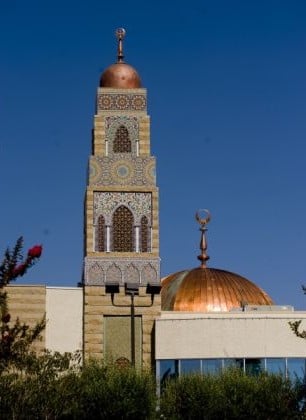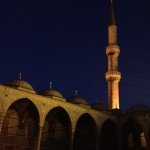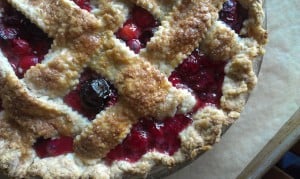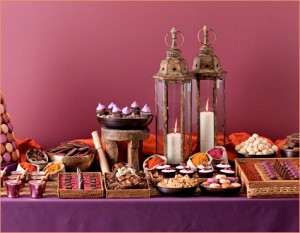Now that I’ve gotten over my pre-Ramadan funk and am well into the thick of this month, it’s a good time to reflect on how my Ramadan is going. Unlike my expected pre-Ramadan moping, this Ramadan has been anything but predictable; in fact, it’s been downright diasporic.
In June I had to make a last-minute cross-country move from Southern California to New York. Thanks to my husband’s oh so “stable” career choice (doctor) and his not-so-organized academic institution, I’m not new to drop-of-the-dime cross-country and international moves. This one, although domestic, has surprisingly proven to be the hardest, and wrought with hitches. We’ve had to move a total of six times within New York so far—we’re not even at our intended abode yet and my law school matriculation date is tapping her foot impatiently in my direction. From craigslist disasters and hotel hopping, to temporary sublets and the backhanded realization that “historic landmark” is synonymous with old and shabby, and “gut-renovation” synonymous with “still not done yet,” our move to a permanent domicile has taken us, inadvertently, into the last week of Ramadan.
Besides the obvious hardships of physically fasting while moving boxes and furniture from location to location in the not-yet-acclimated-to New York heat and humidity—not to mention the added complication of breaking fast in unfurnished spaces with not a pot or pan in sight—just getting familiarized with New York’s masjids and communities has been hard. In Southern California, masjids are plenty and close (alhumdullilah). They boast sprawling prayer-spaces, activities galore, and beautifully mixed communities of worshipers. With huge minarets and domes in tow, they are easily spotted from miles away.
The masjids in New York, specifically Brooklyn, are… different.

They each seem to be havens for one particular community—the Arab masjid, the Bengali masjid, the Punjabi masjid, the Malaysian masjid. They mostly conduct jummah (Friday prayer) in the mother-tongue of these said communities. The “women’s’ prayer spaces” are tiny and empty compared to those back in California. Further, the community members seem to be first-generation, foreign born-immigrants who only understand the language of their motherlands. They are far from the welcoming and mixed Muslim communities of Southern California, and remind me of the stiff, men-dominated aura of mosques abroad.
Needless to say, this Ramadan has tested my commitment to not only exercise a higher level of God-conscious, but simply to be a full participant—the latter being a problem I never had before. I’ve always been blessed, alhumdullilah, with the ability to lean on a beautiful community of worshippers to pull me through the month of Ramadan, to keep me in check, and to be the source of strength at my low points. Now, it’s just my husband (when he’s not on a ridiculous 24-hour call) and I in a temporary place of shelter, humbly furnished with an air mattress, a window-unit A/C, and a prayer rug.
I’m sure you are all familiar with the saying that a person’s character can be determined by what they choose to do—or not to do—when no one is looking. During this Ramadan I’m learning a lot about my spiritual character, which is constantly being tested and exposed because, this time, it’s just God and me in an empty apartment. How am I faring when being deprived the embellishments of beautiful masjid to go to for taraweh, lavish iftars with friends, copious youth-center activities, and impassioned Friday sermons? How persistent am I in my personal ibadah when these Ramadan trappings aren’t a 15-minute drive away? How God-conscious am I when I am being pulled in all directions and there’s no expansive community to ground me in this month’s blessings and festivities?
On the other hand, all these above-mentioned activities have a downside. As Sana puts so eloquently in her recent post, these things can distract us away from personal reflection and we can forget how to be celebratory and how to find God in the quiet places. Sure, it’s easy to remember God when you go to the masjid every night and pray shoulder-to-shoulder with believers. It’s easy to remember God when you meet with Muslim friends during the day and when you are at qiyams listening to lectures well into the wee hours of the morning. But, what if you don’t have the ability to do any of these things?
The word Ramadan is derived from the Arabic word ramida, meaning intense heat and dryness. There’s supposed to be this sense of lacking. There may not be cornucopias of food laid out for us when we break our fast, vast communities of like-minded believers to commune with, or simply a familiar level of comfort. There may be—in the place of these things—a dryness and deficiency of more than just food and drink, music and movies, or cursing and ill-tempers. However, there’s always an abundance of God. With my aching back, straining on a humble air mattress and an arduous sense of lacking and longing, I am reminded that God can be found in all things, all situations, and all spaces—even in the midst of a cross-country dislocation.
For more on Ramadan, and to read the rest of the posts in MMW’s Ramadan 2012 series, click here.












